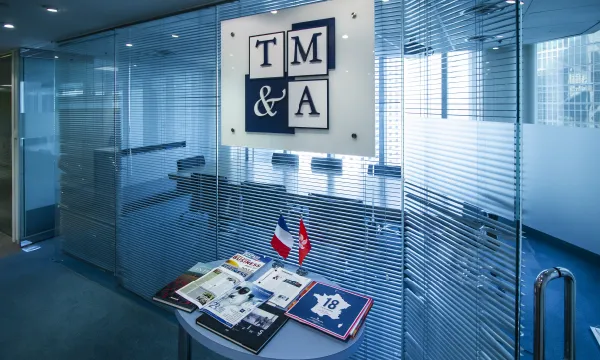
TMA: The largest French law firm in Asia
This has allowed the firm to understand and structure investments in Asia.
Thomas, Mayer & Associés (TMA) is the largest French law firm in Asia by the number of French lawyers in its Hong Kong practice.
Eric-Jean Thomas and Eric Mayer founded the firm in Hong Kong to take advantage of the city’s strategic location. TMA has since then prospered, making use of the legal platform that the territory offers between China and the rest of the world. Its French lawyers provide legal advice in relation mainly to cross border transactions between French-speaking countries and Asia in general with a special emphasis on China.
In the legal field, the strategic importance of Hong Kong has been understood by all major international law firms mainly based in the UK and in the USA: Indeed, all major law firms which were still not present in the territory at the time of the handover, made a move to open an office in the Hong Kong in the past decade, and a great number of them employ mainland Chinese lawyers.
Hong Kong-based Thomas, Mayer & Associés (TMA) has been able to develop its expertise in relation to investments between the two worlds and is now a seasoned deal-maker owing to its more than 20 years of experience in the region.
Intimate knowledge
TMA provides in-depth understanding of Hong Kong legal and tax environment to companies looking to set up investment projects not only in the city but also in other parts of China. Established in 1995, the international law firm specializes in the economic migration of companies from Europe to Southeast Asia and China, and from China and Southeast Asia to Europe, specifically France.
TMA’s knowledge of these cultural, economic and legal environments makes it the go-to law firm for companies seeking to do business in China. Amongst its practice areas are international business law, mergers, acquisitions, joint ventures, corporate and commercial law, international tax law, international arbitration and litigation, as well as private international law and immigration law.
In China, specific legal requirements, such as the incorporation of a Wholly Foreign Owned Enterprise (WFOE), have to be satisfied and are even an economic necessity for foreign companies looking to do business there. Clients also seek TMA’s assistance on drafting and finalizing commercial agreements such as strategic planning of transactions, negotiation of contracts and deal implementation.
The law firm also provides representation in institutional or ad hoc arbitration and alternative dispute mechanisms. It also handles immigration matters by helping foreign companies with their international transfers and cross-border recruitment of existing and new employees.
Its extensive knowledge of Immigration law and government practices and policies, as well as its expertise in handling work permit applications, make it easier for foreign companies to set up their business and hire employees. TMA’s clients range from mid-sized companies to major conglomerates, including tech companies, food and beverage, construction, fashion and cosmetics, pharmaceuticals, medical, as well as fintech, biotech firms and retail.
The law firm also aims to optimize its services by adopting strategies based on the client’s company size and available resources. The TMA team is composed of 30 people led by Senior Partner Eric-Jean Thomas and Managing Partner Eric Mayer.
Structuring investments
China’s local economy has been rapidly shifting from being production-based to being geared more towards new technologies, services, and consumption. Its push for the BRI has also led to many European companies rationalising and restructuring their assets in the region.
These companies have been consolidating disparate assets and optimising financial flows. As a consequence, it becomes necessary to rationalise structures, flows, and decision-making processes to keep up with the rapidly changing economic, legal and tax landscape. This is where TMA’s cadre of topnotch corporate lawyers comes in.
Its more than 23 years of experience on taxation, contracts, and company restructuring enables TMA to implement efficient solutions. Whereas maybe companies wish to choose between Shanghai, Singapore or Hong Kong, it is obvious that the latter’s great number of benefits have made it the preferred hub for many European firms’ headquarters in Asia.
China’s stringent regulations regarding investments have not deterred European investors. Instead, they have realized that the benefits of their investment far outweigh the drawbacks.
Amongst the benefits of setting up a platform in Hong Kong are more than 40 double taxation agreements currently in force, coupled with more than 60 commercial treaties and agreements with China such as CEPA and Trade Processing Agreements, and a unique role as the global hub of choice for RMB transaction. Such advantages do not exist from anywhere else and give Hong Kong a competitive edge with regard to China.
Apart from having a Grade A logistic hub, Hong Kong is worth choosing because it has the leading airport for commercial freight in the world, it enjoys a dynamic commercial legislation and benefits from an easily readable tax system. Certainly, the best indicator of the territory’s competitivity is the fact that 75.5% of Foreign Direct Investment (FDI) in China in 2017 came from Hong Kong.
TMA is also advising mainland Chinese investors investing overseas. TMA established a subsidiary in Paris, France in 2010 with Emma Bensoussan-Cremieux as its local managing partner. All lawyers of TMA’s Paris office are members of the Paris Bar, and being one of the top Asia-Europe deal-makers, it has been able to attract lawyers specialized in international mergers and acquisitions.








![Cross Domain [Manu + SBR + ABF + ABR + FMCG + HBR + ]](https://cmg-qa.s3.ap-southeast-1.amazonaws.com/s3fs-public/styles/exclusive_featured_article/public/2025-01/earth-3537401_1920_4.jpg.webp?itok=WaRpTJwE)









 Advertise
Advertise


